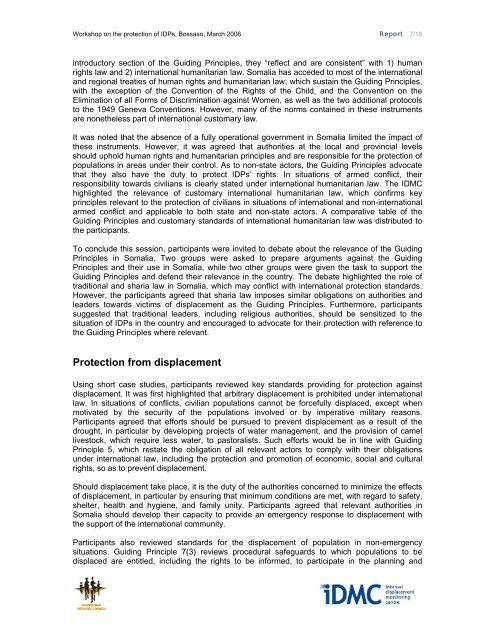Download report - Internal Displacement Monitoring Centre
Download report - Internal Displacement Monitoring Centre
Download report - Internal Displacement Monitoring Centre
You also want an ePaper? Increase the reach of your titles
YUMPU automatically turns print PDFs into web optimized ePapers that Google loves.
Workshop on the protection of IDPs, Bossaso, March 2006 Report 7/18<br />
introductory section of the Guiding Principles, they “reflect and are consistent” with 1) human<br />
rights law and 2) international humanitarian law. Somalia has acceded to most of the international<br />
and regional treaties of human rights and humanitarian law, which sustain the Guiding Principles,<br />
with the exception of the Convention of the Rights of the Child, and the Convention on the<br />
Elimination of all Forms of Discrimination against Women, as well as the two additional protocols<br />
to the 1949 Geneva Conventions. However, many of the norms contained in these instruments<br />
are nonetheless part of international customary law.<br />
It was noted that the absence of a fully operational government in Somalia limited the impact of<br />
these instruments. However, it was agreed that authorities at the local and provincial levels<br />
should uphold human rights and humanitarian principles and are responsible for the protection of<br />
populations in areas under their control. As to non-state actors, the Guiding Principles advocate<br />
that they also have the duty to protect IDPs’ rights. In situations of armed conflict, their<br />
responsibility towards civilians is clearly stated under international humanitarian law. The IDMC<br />
highlighted the relevance of customary international humanitarian law, which confirms key<br />
principles relevant to the protection of civilians in situations of international and non-international<br />
armed conflict and applicable to both state and non-state actors. A comparative table of the<br />
Guiding Principles and customary standards of international humanitarian law was distributed to<br />
the participants.<br />
To conclude this session, participants were invited to debate about the relevance of the Guiding<br />
Principles in Somalia. Two groups were asked to prepare arguments against the Guiding<br />
Principles and their use in Somalia, while two other groups were given the task to support the<br />
Guiding Principles and defend their relevance in the country. The debate highlighted the role of<br />
traditional and sharia law in Somalia, which may conflict with international protection standards.<br />
However, the participants agreed that sharia law imposes similar obligations on authorities and<br />
leaders towards victims of displacement as the Guiding Principles. Furthermore, participants<br />
suggested that traditional leaders, including religious authorities, should be sensitized to the<br />
situation of IDPs in the country and encouraged to advocate for their protection with reference to<br />
the Guiding Principles where relevant.<br />
Protection from displacement<br />
Using short case studies, participants reviewed key standards providing for protection against<br />
displacement. It was first highlighted that arbitrary displacement is prohibited under international<br />
law. In situations of conflicts, civilian populations cannot be forcefully displaced, except when<br />
motivated by the security of the populations involved or by imperative military reasons.<br />
Participants agreed that efforts should be pursued to prevent displacement as a result of the<br />
drought, in particular by developing projects of water management, and the provision of camel<br />
livestock, which require less water, to pastoralists. Such efforts would be in line with Guiding<br />
Principle 5, which restate the obligation of all relevant actors to comply with their obligations<br />
under international law, including the protection and promotion of economic, social and cultural<br />
rights, so as to prevent displacement.<br />
Should displacement take place, it is the duty of the authorities concerned to minimize the effects<br />
of displacement, in particular by ensuring that minimum conditions are met, with regard to safety,<br />
shelter, health and hygiene, and family unity. Participants agreed that relevant authorities in<br />
Somalia should develop their capacity to provide an emergency response to displacement with<br />
the support of the international community.<br />
Participants also reviewed standards for the displacement of population in non-emergency<br />
situations. Guiding Principle 7(3) reviews procedural safeguards to which populations to be<br />
displaced are entitled, including the rights to be informed, to participate in the planning and
















